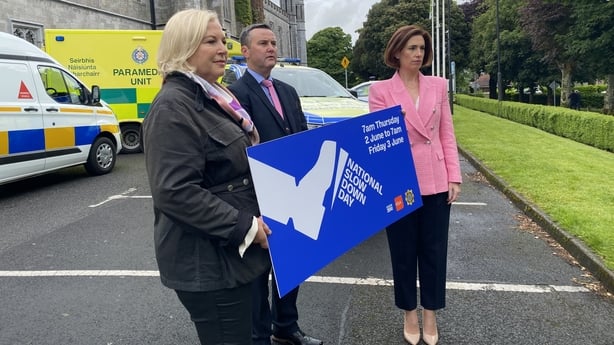Gardaí and the Road Safety Authority have urged motorists to slow down ahead of this bank holiday weekend, with one motorist in Dublin today detected traveling at 140km/h in an 80km/h zone.
A 24-hour speed limit enforcement operation is under way from 7am this morning until 7am tomorrow as part of National 'Slow Down Day'.
Figures released by An Garda Síochána and GoSafe show that as of 4pm this afternoon, 374 vehicles out of 78,911 were caught speeding on roads.
One motorist travelling on the N4 Doddsborough at Lucan was detected travelling at 140km/h - 60km/h above the speed limit on the road.
Another motorist was found to be travelling at 119km/h within an 80km/h zone on the N4 Ballydowd in Lucan.
Many drivers detected speeding on roads so far today were in excess of 20km/h above the speed limit.
70 people have died on Irish roads so far this year, an increase of 26 deaths compared to the same period last year.
At one checkpoint in Galway city, one of over 1,300 high-visibility speed enforcement zones in the 24-hour operation, found 121 people exceeding the speed limit within two hours of getting under way.
In a recent study of over 5,000 vehicles, the RSA found that over three quarters of the drivers observed, were speeding in 50km/h zones.
Speaking at the campaign launch in NUI Galway, Minister of State at the Department of Transport Hildegarde Naughton said the findings were concerning.
"These are speed zones that are rich in pedestrians and cyclists," she said.
"Reducing the risk posed to vulnerable road users in these speed zones and encouraging safer, greener active travel is one of the key priorities of the new Government Road Safety Strategy.
"For example, we are reviewing speed limits and examining the possibility of a greater roll-out of 30km/h speed zones, as well as conducting a review of penalties related to speeding.
"New in vehicle safety assist technology such as Intelligent Speed Assistance and the roll out of average speed cameras will also contribute to preventing speed related harm.
"While all these actions are important to reducing speeding on our roads, it is important to remember that we all have a shared responsibility as individuals and a society to slow down to and protect ourselves and other road users."
Over the past five years, June Bank Holiday collisions have seen the number of people killed or seriously injured rise to 90.
In the latest RSA study, 77% of speeding fatalities occurred on rural roads.

RSA Chairperson Liz O'Donnell said: "This is particularly dangerous on higher speed rural roads which are often narrow, and where bends and corners can restrict a driver's vision.
"Just over three quarters of driver fatalities who were speeding occurred on rural roads.
"There are no margins for error on these roads which is why drivers need to slow down when using them.
"By slowing down you give yourself time and space to react to something unexpected around the next corner, like a tractor emerging from a field or a group of cyclists."
The RSA said studies have repeatedly shown that drivers overestimate the amount of time they can gain by speeding in what is known as the speed fallacy.
RSA Chief Executive Sam Waide said: "The perceived gain of time is much larger than the actual gain of time, which is in fact only marginal.
"For example, completing an average journey of 14 kilometres at 90km/h instead of 80km/h only saves one minute and eight seconds.
"So, while you might gain one or two minutes journey time you risk losing your license and potentially your livelihood."
Gardaí and the Road Safety Authority launch national 'Slow Down Day' ahead of June Bank Holiday weekend. 24 hr speed enforcement operation underway in 1300 zones nationwide @rtenews @RSAIreland @gardainfo @GardaTraffic #SlowDownDay pic.twitter.com/2YQ2zgiE29
— Teresa Mannion (@TeresaMannion) June 2, 2022
Assistant Commissioner for Roads Policing and Community Engagement Paula Hilman said slowing down a little has been shown to make a big difference.
"The World Health Organization has estimated that a 5% reduction in average speed could result in a 30% reduction in fatal collisions, and therefore reducing motorists' speed is essential to improving safety on our roads..
"Remember that speeding is not worth the potential devastating loss of life or serious injury but also isn’t worth the very real risk of losing your licence – if you are detected speeding you will receive three penalty points on your licence, if you get 12 penalty points in three years you will lose your licence for six months.
"A lower threshold of seven points applies for learner drivers. Think of the impact a disqualification would have not only on your daily life but those who rely on you - family, friends, partners."

